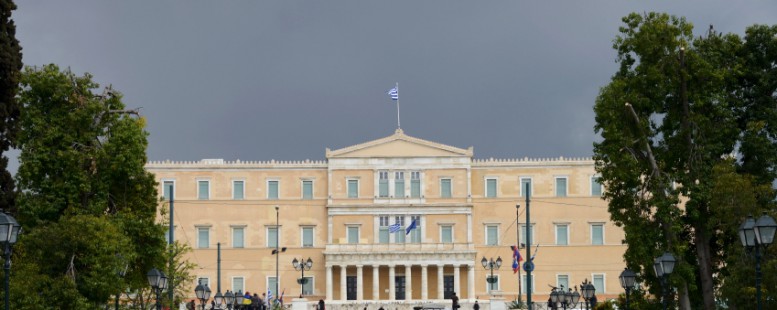Our Opinion: 2016
Greece braced for more austerity

It’s been almost a year since I was last in Athens, but life continues as before. I was unable to travel from the airport on the metro since it is on strike, together with trains, trams and buses. It is part of the protest against continued austerity in advance of a crucial Parliamentary vote this evening.
Greece cannot meet the terms of the third bailout package agreed last year. The country has run out of cash again, there are violent protests in Athens against austerity measures; and Euro-zone finance ministers met in Brussels to discuss what to do about it. Predictably, they decided to put off the difficult decisions.
In order to receive this bailout, (some €86bn), Greece is supposed to commit to achieving a primary budget surplus (before interest payments) of an impossible 3.5% of GDP. This is creating a growing rift between the Europeans and the International Monetary Fund (IMF). The IMF thinks there is no way Greece can manage a 3.5% of GDP primary surplus, and suggests a 1.5% surplus and a write-off of some of Greece’s debt instead.
The economy has shrunk by 25% in eight years, a fall equivalent to America’s during the Great Depression, and has contracted again in the first quarter of this year.
But significant concessions are politically indigestible for Euro-zone governments. The most likely outcome, as always, is a fudge: an agreement that gives creditors just enough confidence to release the next slug of cash, without putting Greece’s finances on a sustainable footing.
EU spokesman are making reassuring noises about the state of play over the everlasting Greek debt crisis and negotiations.
What has actually happened, of course, is that a significant portion of money lent to Greece has been lost. Greece will never repay its debt at anything like market rates. Most of the current arguments and negotiations are about how to avoid having to explain that fact.
Greece is “very close” to a debt relief deal according to Pierre Moscovici, the European economic affairs commissioner. He said that Greece and its creditors were “approaching a crucial moment in these discussions and I am confident and and hopeful that we can reach a positive conclusion because it is simply in everyone’s interest to do so”.
Eurogroup head, Jeroen Dijsselbloem, has said the euro area had already provided aid to Greece at a “very low interest rate.” He said they are now looking at different instruments to service Greece’s debt. “There are other levers that you can use, like maturity periods, grace periods, swaps of more expensive loans for cheaper loans. All of these instruments, we’re considering.” He said some measures an be taken “up front” and some will be for a later date.
There is no possibility at all that any Greek government that would manage to continue in power could ever raise enough in taxes to pay off the country’s current debt. In a functioning global economy, the country would have no option to declare itself bankrupt and default on its debt. However, that would mean it leaves the Euro-zone, which is politically unacceptable to those who persuaded this poor country to enter the single currency in 2002.
The Greek government would prefer to see all its creditors cut the total amount that needs to be repaid. This can then be presented as a victory to the Greek voters. The creditors would rather restructure the debt. In economic terms, they are the same thing. Telling people that it will just take a little longer to get all the money back doesn’t seem like a loss in quite the same way.
With European stability on top of the agenda, particularly as we get closer to the UK’s referendum on remaining in the EU, discussions are really centering on how to agree that the money has been lost, but without having to tell the voters that it has been.
In preparation for Tuesday’s Euro-zone meeting, lawmakers in Athens vote tonight on a comprehensive bill that raises taxes and transfers thousands of real estate assets from the state to a new privatization fund. The Prime Minister, Alexis Tsipras, is rightly nervous that this will test the resilience of his three-seat parliamentary majority. No wonder then that he’s said “It’s not time for exits in Europe, it’s time for more cooperation.”
Alexander Wade
22nd May 2016
